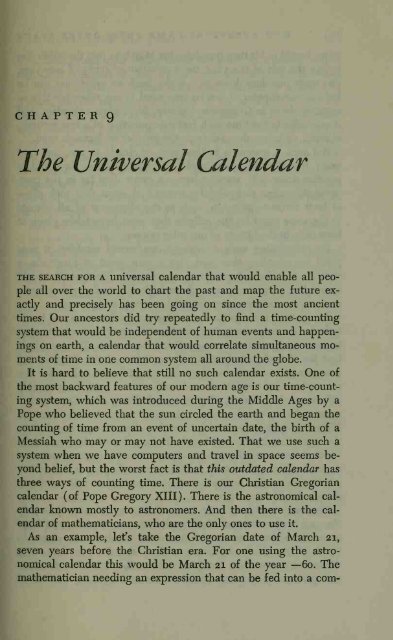You also want an ePaper? Increase the reach of your titles
YUMPU automatically turns print PDFs into web optimized ePapers that Google loves.
CHAPTER 9<br />
The Universal Calendar<br />
THE SEARCH FOR A univcrsal calendar that would enable all people<br />
all<br />
over the world to chart the past and map the future exactly<br />
and precisely has been going on since the most ancient<br />
times. Our ancestors did try repeatedly to find a time-coimting<br />
system that would be independent of human events and happenings<br />
on earth, a calendar that would correlate simultaneous moments<br />
of time in one common system all around the globe.<br />
It is hard to believe that still no such calendar exists. One of<br />
the most backward features of our modern age is our time-counting<br />
system, which was introduced during the Middle Ages by a<br />
Pope who believed that the sun circled the earth and began the<br />
counting of time from an event of uncertain date, the birth of a<br />
Messiah who may or may not have existed. That we use such a<br />
system when we have computers and travel in space seems beyond<br />
belief, but the worst fact is that this outdated calendar has<br />
three ways of counting time. There is our Christian Gregorian<br />
calendar (of Pope Gregory XIII). There is<br />
the astronomical calendar<br />
known mosdy to astronomers. And then there is<br />
the calendar<br />
of mathematicians, who are the only ones to use it.<br />
As an example, let's take the Gregorian date of March 21,<br />
seven years before the Christian era. For one using the astronomical<br />
calendar this would be March 21 of the year —60. The<br />
mathematician needing an expression that can be fed into a com-

















